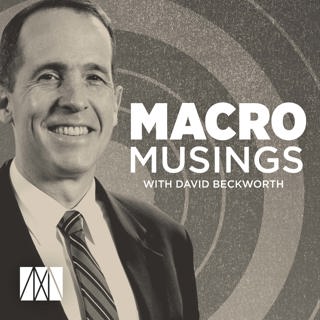
23 - Michael Bordo on Anna Schwartz, Financial Crises, and Life as a Monetary Historian
Michael D. Bordo is a professor of economics and the director of the Center for Monetary and Financial History at Rutgers University, a Distinguished Visiting Fellow at the Hoover Institution, and a research associate at the National Bureau of Economic Research. He has also been a visiting scholar at numerous central banks across the world. Michael, a prolific scholar, joins the show to discuss a long career in monetary economics, including his research with the legendary Anna Schwartz. He shares his thoughts on the Great Recession and how it compares with the Great Depression. Additionally, he challenges the notion that financial crises like the 2007-2009 crisis are necessarily followed by slow recoveries. David and Michael also chat about the history of American banking law and how restrictions on interstate-branch banking until the 1990s hindered economic growth. Finally, Michael gives some advice about how to be a successful monetary historian! David's blog: macromarketmusings.blogspot.com Michael Bordo's homepage: https://sites.google.com/site/michaelbordo/ David's Twitter: @davidbeckworth Related links: Michael Bordo in The Wall Street Journal: "Financial Recessions Don't Lead to Weak Recessions" http://www.wsj.com/articles/SB10000872396390444506004577613122591922992 "A Lesson from the Great Depression that the Fed Might have Learned: A Comparison of the 1932 Open Market Purchases with Quantitative Easing" http://www.frbsf.org/economic-research/files/S01_P1_Arunima-Sinha.pdf "A Fiscal Union for the Euro: Some Lessons from History" http://www.nber.org/papers/w17380 "Under What Circumstances can Inflation be a Solution to Excessive National Debt: Some Lessons from History" http://docplayer.net/6583440-Under-what-circumstances-can-inflation-be-a-solution-to-excessive-national-debt-some-lessons-from-history.html
12 Sep 20161h 2min

22 - Peter Ireland on the Chicago School, Federal Reserve Policy Targets, and Monetary Aggregates
Peter Ireland is the Murray and Monti Professor of Economics at Boston College, a research associate at the National Bureau of Economic Research, and a member of the Shadow Open Market Committee. He joins the show to discuss his experience as a student at the University of Chicago as well as the nuts and bolts of how the Federal Reserve sets out to achieve its short-, medium-, and long-term objectives. David and Peter also discuss the role of monetary aggregates in monetary policy. Economists largely don't pay much attention to the traditional simple-sum measures of the money supply anymore, but Ireland argues that more complex measures of money, called Divisia indices, can teach us a lot about the stance of monetary policy. [To learn more about the upcoming conference, Monetary Rules for a Post-Crisis World, co-hosted by the Mercatus Center and the Cato Institute, and register, please click the link below. You can also watch the conference online by clicking the link.] http://mercatus.org/content/register-monetary-rules-post-crisis-world David's blog: macromarketmusings.blogspot.com/ Peter Ireland's personal website: https://www2.bc.edu/peter-ireland/ Peter Ireland's Boston college profile: http://www.bc.edu/schools/cas/economics/faculty-and-staff/faculty-listing/peter-ireland.html David's Twitter: @davidbeckworth Peter Ireland's Twitter: @PIrelandatBC Related links: The Shadow Open Market Committee http://shadowfed.org/ A "Working" Solution to the Question of Nominal GDP Targeting by Peter Ireland and Michael Belongia https://dlib.bc.edu/islandora/object/bc-ir:103357/datastream/PDF/view
5 Sep 20161h 1min

21 – Hugh Rockoff on Optimal Currency Areas, "Yellowbacks," and Free Banking
Hugh Rockoff is a professor of economics at Rutgers University and has done extensive work in U.S. monetary history. He joins the show to discuss the criteria for an ideal monetary union and argues that the U.S. didn't really become an optimal currency area until the 1930s. David and Hugh then discuss whether a present-day example, the Eurozone, fits these criteria. They also talk about interesting chapters in U.S. monetary history, including the Civil War, the Free Banking Era, and the bimetallism debate of the late 1800s. [To learn more about the upcoming conference, Monetary Rules for a Post-Crisis World, co-hosted by the Mercatus Center and the Cato Institute, and register, please click the link below. You can also watch the conference online by clicking the link.] http://mercatus.org/monetaryconference?utm_source=MacroMusingsPodcast&utm_medium=link&utm_campaign=MonetaryRules David's blog: http://macromarketmusings.blogspot.com/ Hugh Rockoff's homepage: http://econweb.rutgers.edu/rockoff/ David's Twitter: @davidbeckworth Related links History of the American Economy by Hugh Rockoff and Gary M. Walton https://www.amazon.com/History-American-Economy-Economics-Titles/dp/1111822921 "How Long Did It Take the United States to Become an Optimal Currency Area?" (National Bureau of Economic Research) http://www.nber.org/papers/h0124 "The Wizard of Oz as a Monetary Allegory" (The Journal of Political Economy) https://www.unc.edu/~salemi/Econ006/Rockoff.pdf The Free Banking Era: A Re-Examination (Dissertations in American Economic History) https://www.amazon.com/Free-Banking-Era-Re-Examination-Dissertations/dp/0405072155
29 Aug 20161h

20 - Douglas Irwin on Free Trade, the Gold Standard, and American Economic History
Douglas Irwin, professor of economics at Dartmouth College and author of Free Trade Under Fire (Princeton University Press, 2015), joins the show to discuss the economic arguments for free trade and the reasons for the heated politics surrounding trade. He describes the history of U.S. trade policy from the Embargo Act of 1808 to the Smoot-Hawley Tariff of 1930 to the North American Free Trade Agreement (NAFTA). Finally, he and David discuss the role of the inter-war gold standard during the Great Depression. [To learn more about the upcoming conference, Monetary Rules for a Post-Crisis World, co-hosted by the Mercatus Center and the Cato Institute, and register, please click the link below. You can also watch the conference online by clicking the link.] http://mercatus.org/monetaryconference?utm_source=MacroMusingsPodcast&utm_medium=link&utm_campaign=MonetaryRules David's blog: http://macromarketmusings.blogspot.com/ Douglas Irwin's homepage: https://www.dartmouth.edu/~dirwin/ David's Twitter: @davidbeckworth Douglas Irwin's Twitter: @D_A_Irwin Related links: "The Truth About Trade: What Critics Get Wrong About the Global Economy" (Foreign Affairs) https://www.foreignaffairs.com/articles/2016-06-13/truth-about-trade Free Trade Under Fire (Princeton University Press, fourth edition 2015) https://www.amazon.com/Free-Trade-under-Fire-Fourth/dp/0691166250 "The Welfare Cost of Autarky: Evidence from the Jeffersonian Trade Embargo," 1807-09. Review of International Economics. http://www.dartmouth.edu/~dirwin/docs/Embargo.pdf "Did France Cause the Great Depression?" (NBER Working Paper) http://www.nber.org/papers/w16350
22 Aug 201657min

19 - Nick Rowe on Monetary Basics, Milton Friedman's Thermostat, and More
Nick Rowe is a professor of economics at Carleton University in Ottawa, a member of the CD Howe Institute's Monetary Policy Council and of Carlton University's Centre for Monetary and Financial Economics, and a popular blogger at "Worthwhile Canadian Initiative." He developed an interest in macroeconomics as he came of age in the United Kingdom during the high inflation period from the late 1960s to 1970s. Nick joins the show to discuss some of the basics of monetary economics and argues that money is the critical factor that distinguishes macroeconomics from microeconomics. He also shares his thoughts on helicopter money, which he thinks is "small beer" or not as big a deal as commentators make it out to be. Finally, David and Nick also discuss some helpful analogies Nick has used to illustrate economic concepts including "Milton Friedman's thermostat" – how a good thermostat works like a good central bank! David's blog: http://macromarketmusings.blogspot.com/ Nick Rowe's blog: http://worthwhile.typepad.com/ David's Twitter: @DavdBeckworth Nick Rowe's Twitter: @MacRoweNick Related links Centre for Monetary and Financial Economics (homepage) http://carleton.ca/economics/research/cmfe/ "What Makes a Central Bank? Asymmetric Redeemability and the Will to Act as One." http://worthwhile.typepad.com/worthwhile_canadian_initi/2009/10/what-makes-a-bank-a-central-bank.html "Helicopter Money is Small Beer, and Normal" http://worthwhile.typepad.com/worthwhile_canadian_initi/2016/05/helicopter-money-is-small-beer.html "Is Money a Liability?" http://worthwhile.typepad.com/worthwhile_canadian_initi/2012/03/is-modern-central-bank-money-a-liability.html "Milton Friedman's Thermostat" http://worthwhile.typepad.com/worthwhile_canadian_initi/2010/12/milton-friedmans-thermostat.html
15 Aug 201659min

18 - Jason Taylor on the Great Depression, World War II, and "The Big Push"
Jason Taylor, professor of economics at Central Michigan University and editor-in-chief of "Essays in Economic & Business History," is an expert in U.S. economic history, particularly during the Great Depression and World War II. He joins the show to discuss the causes of the Great Depression and the policy responses under Herbert Hoover and Franklin D. Roosevelt. David and Jason look at policies ranging from the international gold standard to the National Industrial Recovery Act. They also explore the possibility that large public spending during the New Deal and World War II may have facilitated a "Big Push" that helped modernize the American South. Finally, Jason and David also examine parallels between the Great Depression and the Great Recession. David's blog: http://macromarketmusings.blogspot.com/ David's Twitter: @davidbeckworth Jason's webpage: https://sites.google.com/site/taylo2je/ Jason's article, "Did New Deal and World War II Public Capital Investments Facilitate a "Big Push" in the American South? https://www.jstor.org/stable/40752762?seq=1#page_scan_tab_contents
8 Aug 201658min

17 - Brad DeLong on Hamiltonian Political Economy and American Economic History
J. Bradford DeLong – professor of economics at UC-Berkeley, research associate at the National Bureau of Economic Research, and a deputy assistant secretary of the U.S. Treasury during Bill Clinton's presidency – joins the show to discuss his new book, "Concrete Economics: The Hamilton Approach to Economic Growth and Policy." Brad's book, co-authored with Stephen Cohen, argues that rather than relying on abstract theory, Hamilton economics is based on facts that demonstrate how the American economy has benefited from pragmatic government policies throughout its history. David and Brad also discuss Brad's education at Harvard and how he is a "speed reader"! David's blog: http://macromarketmusings.blogspot.com/ Brad DeLong's blog: http://delong.typepad.com/ Brad DeLong's UC Berkeley profile https://www.econ.berkeley.edu/faculty/812 David's Twitter: @DavidBeckworth Brad DeLong's Twitter: @DeLong Related links "Concrete Economics: The Hamilton Approach to Economic Growth and Policy (2016)" by Stephen S. Cohen and J. Bradford DeLong https://www.amazon.com/Concrete-Economics-Hamilton-Approach-Economic/dp/1422189813 "The End of Influence: What Happens When Other Countries Have the Money" by Stephen S. Cohen and J. Bradford DeLong (2010) https://www.amazon.com/End-Influence-Happens-Other-Countries/dp/B004MKLS28 Brad DeLong's Journal of Economics article, "The Triumph of Monetarism?" (2000) https://www.aeaweb.org/articles?id=10.1257/jep.14.1.83
1 Aug 201646min

16 - David Andolfatto on Life at the Fed, Equity-Based Finance, and the Blockchain
David Andolfatto is a vice president of the St. Louis Federal Reserve Bank and a professor of economics at Simon Fraser University. He joins the show to discuss life at the St. Louis Fed, equity-based finance as a means of averting financial crises, and challenges in using monetary policy to drive nominal growth. Finally, David also clarifies some of the misconceptions surrounding Blockchain technology and explains what this technology may mean for Federal Reserve policy. David Beckworth's Twitter: @davidbeckworth David Beckworth's Blog: http://macromarketmusings.blogspot.com/ David Andolfatto's Twitter: @dandolfa David Andolfatto's Blog: http://andolfatto.blogspot.com/ Related links The Diamond-Dybvig Model on bank runs: https://www.macroeconomics.tu-berlin.de/fileadmin/fg124/financial_crises/literature/Diamon_Dybvig_Bank_Runs__Deposit_Insurance__and_Liquidity.pdf David Andolfatto on "A Dirty Little Secret" about monetary policy: http://andolfatto.blogspot.com/2014/11/a-dirty-little-secret.html
25 Jul 201659min






















